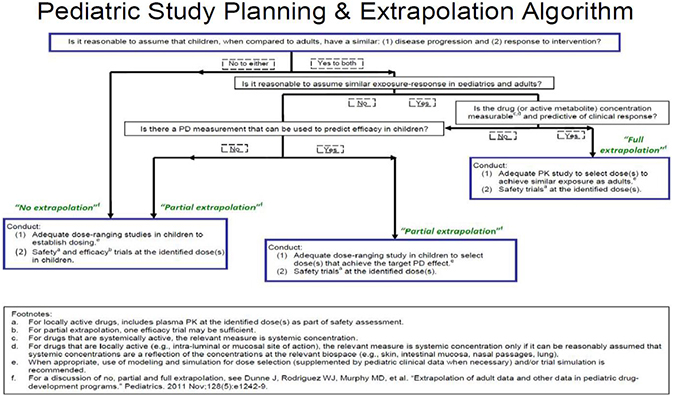Transl Clin Pharmacol.
2018 Dec;26(4):155-159. 10.12793/tcp.2018.26.4.155.
Regulatory innovation for expansion of indications and pediatric drug development
- Affiliations
-
- 1Department of Clinical Pharmacology, Severance Hospital, Yonsei University College of Medicine, Seoul 03722, Korea. minspark@yuhs.ac
- 2Department of Pediatrics, Yonsei University College of Medicine, Seoul 03722, Korea.
- KMID: 2429510
- DOI: http://doi.org/10.12793/tcp.2018.26.4.155
Abstract
- For regulatory approval of a new drug, the most preferred and reliable source of evidence would be randomized controlled trials (RCT). However, a great number of drugs, being developed as well as already marketed and being used, usually lack proper indications for children. It is imperative to develop properly evaluated drugs for children. And expanding the use of already approved drugs for other indications will benefit patients and the society. Nevertheless, to get an approval for expansion of indications, most often with off-label experiences, for drugs that have been approved or for the development of pediatric indications, either during or after completing the main drug development, conducting RCTs may not be the only, if not right, way to take. Extrapolation strategies and modelling & simulation for pediatric drug development are paving the road to the better approval scheme. Making the use of data sources other than RCT such as EHR and claims data in ways that improve the efficiency and validity of the results (e.g., randomized pragmatic trial and randomized registry trial) has been the topic of great interest all around the world. Regulatory authorities should adopt new methodologies for regulatory approval processes to adapt to the changes brought by increasing availability of big and real world data utilizing new tools of technological advancement.
Keyword
MeSH Terms
Figure
Reference
-
1. E11(R1) Addendum: Clinical Investigation of Medicinal Products in the Pediatric Population. Accessed 3 Dec 2018. https://www.ich.org/fileadmin/Public_Web_Site/ICH_Products/Guidelines/Efficacy/E11/E11_R1_GuidelineWithAddendum_Step4.pdf.2. New Pediatric Labeling Information Database. Accessed 3 Dec 2018. https://www.accessdata.fda.gov/scripts/sda/sdNavigation.cfm?filter=&sortColumn=1d&sd=labelingdatabase&page=1.3. Eguale T, Buckeridge DL, Verma A, Winslade NE, Benedetti A, Hanley JA, et al. Association of Off-label drug use and adverse drug events in an adult population. JAMA Intern Med. 2016; 176:55–63. DOI: 10.1001/jamainternmed.2015.6058.
Article4. Gupta SK, Nayak RP. Off-label use of medicine: Perspective of physicians, patients, pharmaceutical companies and regulatory authorities. J Pharmacol Pharmacother. 2014; 5:88–92. DOI: 10.4103/0976-500X.130046.
Article5. Mulugeta LY, Yao L, Mould D, Jacobs B, Florian J, Smith B, et al. Leveraging big data in pediatric development programs. Proceedings from the 2016 American college of clinical pharmacology annual meeting symposium. Clin Pharmacol Ther. 2018; 104:81–87. DOI: 10.1002/cpt.975.
Article6. US FDA Guidance for Industry- General Clinical Pharmacology Considerations for Pediatric Studies for Drugs and Biological Products 2014. Accessed 30 Nov, 2018. available at https://www.fda.gov/downloads/Drugs/GuidanceComplianceRegulatoryInformation/Guidances/UCM425885.pdf.7. Frieden TR. Evidence for health decision making - Beyond randomized, controlled trials. N Engl J Med. 2017; 377:465–475. DOI: 10.1056/NEJMra1614394.
Article8. US Food and Drug Administration. FDA D.I.S.C.O.: Avelumab in Merkel cell carcinoma transcript. Accessed 30 Nov, 2018. https://www.fda.gov/Drugs/InformationOnDrugs/ApprovedDrugs/ucm559876.htm.9. Alexion Receives Approval for Important Updates to the European Label for Soliris (eculizumab). Business Wire;Accessed 30 Nov, 2018. http://www.businesswire.com/news/home/20150409006360/en/Alexion-Receives-Approval-Important-Updates-European-Label.10. Califf RM, Sugarman J. Exploring the ethical and regulatory issues in pragmatic clinical trials. Clin Trials. 2015; 12:436–441. DOI: 10.1177/1740774515598334.
Article11. Dreyer NA. Advancing a framework for regulatory use of real-World evidence: When real is reliable. Ther Innov Regul Sci. 2018; 52:362–368. DOI: 10.1177/2168479018763591.
Article12. Liu JB, D'Angelica MI, Ko CY. The randomized registry trial: Two birds, One stone. Ann Surg. 2017; 265:1064–1065. DOI: 10.1097/SLA.0000000000002166.13. Lauer MS, D'Agostino RB Sr. The randomized registry trial -- the next disruptive technology in clinical research? N Engl J Med. 2013; 369:1579–1581.
Article14. James S, Rao SV, Granger CB. Registry-based randomized clinical trials--a new clinical trial paradigm. Nat Rev Cardiol. 2015; 12:312–316. DOI: 10.1038/nrcardio.2015.33.
Article15. Fröbert O, Lagerqvist B, Gudnason T, Thuesen L, Svensson R, Olivecrona GK, et al. Thrombus Aspiration in ST-Elevation myocardial infarction in Scandinavia (TASTE trial): a multicenter, prospective, randomized, controlled clinical registry trial based on the Swedish Angiography and Angioplasty Registry (SCAAR) platform: study design and rationale. Am Heart J. 2010; 160:1042–1048. DOI: 10.1016/j.ahj.2010.08.040.
Article
- Full Text Links
- Actions
-
Cited
- CITED
-
- Close
- Share
- Similar articles
-
- Case Analysis in Drug Approval by FDA/EMA Using Real-World Data/Real-World Evidence
- In vitro Expansion of Natural Regulatory T Lymphocytes Useful for Cell Therapy in Allotransplantation
- New drug development and clinical trial
- Analysis of Trends in Regulatory Science and Regulatory Science Experts Training Projects: US, Japan, Singapore, and Korea
- Current Indications for Spinal Endoscopic Surgery and Potential for Future Expansion


